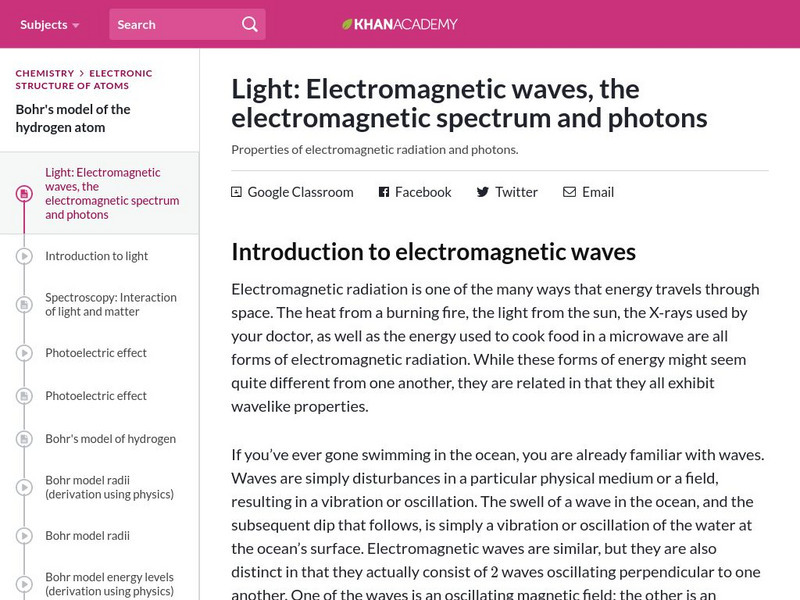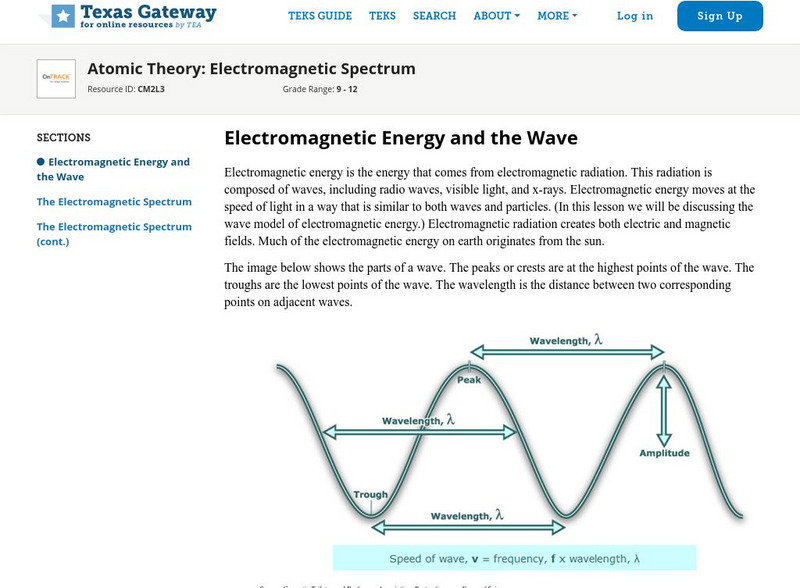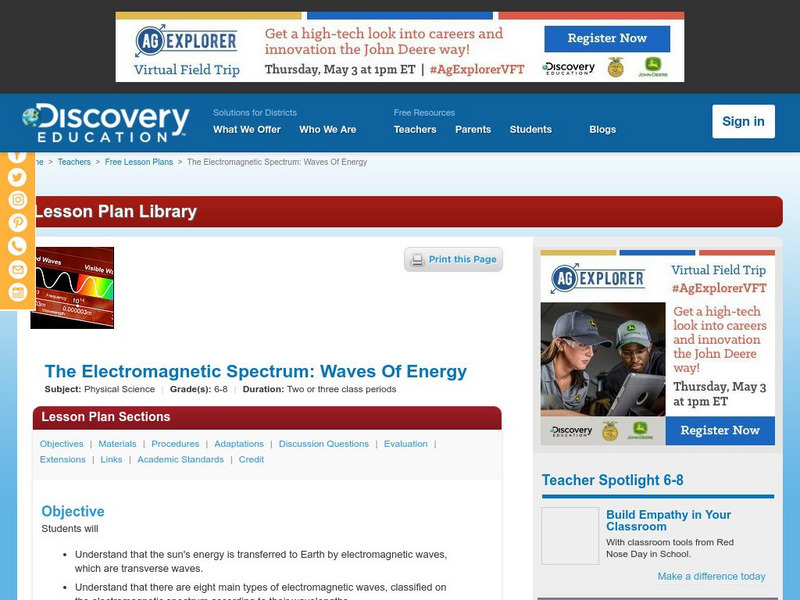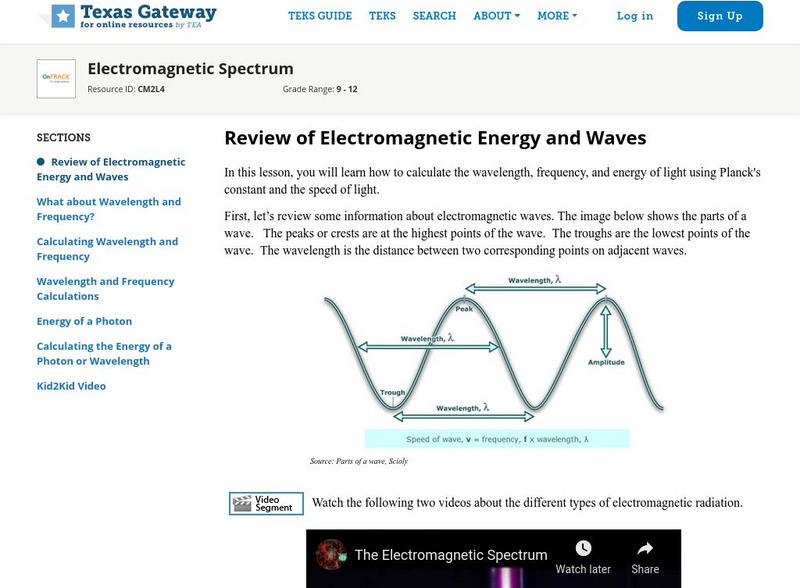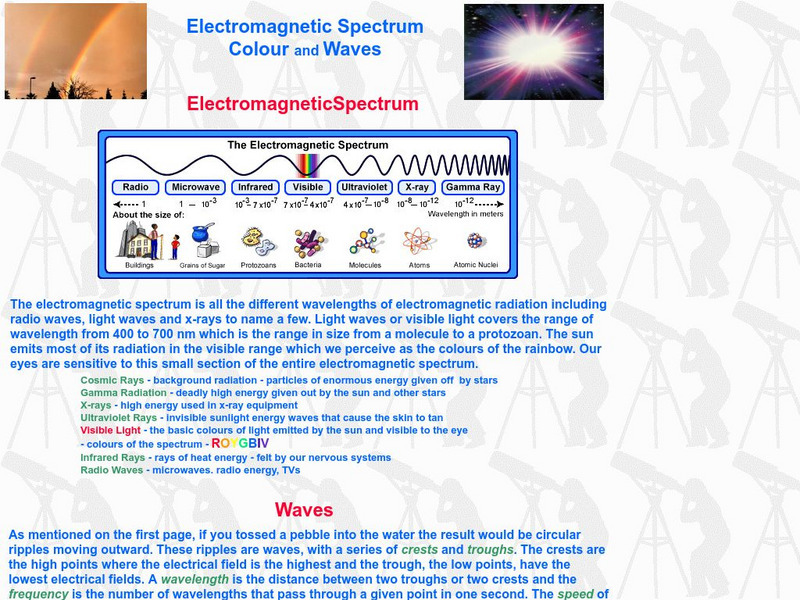Curated OER
Day and Night
Students using experiments try to demonstrate how observations can be affected by the cycles of night and day.
Curated OER
Good Vibrations
Students demonstrate sound waves and make changes in the waves
resulting in changes in pitch. Students associate changes in pitch in various "musical instruments"with size and shape and the sound waves they produce.
Curated OER
Color Recognition
Students envision how space observatories make use of monochromatic filters to collect data on the color of objects in space. They see the actual colors of objects when they are in monochromatic light.
Curated OER
You, Me and UV
Pupils explore the validity of claims of UV protection. Students research UV rays and the cancer danger presented by these rays. Working in groups, they perform tests on sunglass and sunscreen products to determine if their claim of UV...
Curated OER
Twisted Vision
Students explain polarization vision and why some animals have it while others do not. They examine the reasons why it would be helpful for marine organisms to have polarized light.
Curated OER
Honors Chemistry I
In this honor chemistry I worksheet, students use all available resources to answer each question given. Students apply their knowledge of light, quantum theory of light, Bohr's model, photoelectric theory.
Curated OER
All Those Seeing Color, Say Eye!
Young scholars discuss feelings and explore how to recognize how they are feeling. In this exploratory lesson students discuss conflict and ways to resolve problems.
Curated OER
Wavelength and Energy
Students using a rope and other materials explore wavelengths and frequency. If time permits, more experiments can be tried.
Curated OER
To See or Not to See
Young scholars identify and discuss key factors that determine how effective color camouflage is in certain habitats. For this investigative lesson students divide into groups and study light.
Curated OER
AP Chemistry Atomic Structure-7 Worksheet
In this atomic structure worksheet, students solve twelve problems related to wavelength, frequency, electron transitions, emission spectra and quantum number.
Khan Academy
Khan Academy: Electromagnetic Waves: The Electromagnetic Spectrum and Photons
An article that discusses the coupling of an electric field with a magnetic field to create electromagnetic waves. Article also discusses how different types of electromagnetic waves have different wavelengths which forms the...
PBS
Pbs Learning Media: The Electromagnetic Spectrum: Frontline
This video segment adapted from FRONTLINE introduces the electromagnetic spectrum and explains how the various types of electromagnetic waves are distinguished by the amount of energy each wave carries.
CK-12 Foundation
Ck 12: Earth Science: Study of Space by the Electromagnetic Spectrum
[Free Registration/Login may be required to access all resource tools.] Overview of the electromagnetic spectrum.
Texas Education Agency
Texas Gateway: Atomic Theory: Electromagnetic Spectrum
This tutorial reviews the electromagnetic spectrum.
TeachEngineering
Teach Engineering: Exploring the Electromagnetic Spectrum
Students learn the basics of the electromagnetic spectrum and how various types of electromagnetic waves are related in terms of wavelength and energy. In addition, they are introduced to the various types of waves that make up the...
NASA
Nasa: Space Place: The Electromagnetic Spectrum
Find out how energy, frequency, and wavelength are related in terms of the electromagnetic spectrum.
NASA
Nasa: Tour of the Electromagnetic Spectrum: Visible Light
Visible light waves are the only electromagnetic waves we can see. We see these waves as the colors of the rainbow. Each color has a different wavelength. Red has the longest wavelength and violet has the shortest wavelength. When all...
NASA
Nasa: Imagers: The Electromagnetic Spectrum
NASA site provides information on waves, electromagnetic waves and their wavelengths.
Discovery Education
Discovery Education: The Em Spectrum: Waves of Energy
Students are introduced to the electromagnetic spectrum through this group research activity. Each group investigates a different wavelength range within the em spectrum and reports back to class. Discussion ideas also included.
CK-12 Foundation
Ck 12: Physical Science: Electromagnetic Spectrum
[Free Registration/Login may be required to access all resource tools.] Covers electromagnetic radiation and its properties, and the electromagnetic spectrum.
TeachEngineering
Teach Engineering: Visible Light and the Electromagnetic Spectrum
In this lesson, the electromagnetic spectrum is explained and students learn that visible light makes up only a portion of this wide spectrum. Students also learn that engineers use electromagnetic waves for many different applications.
Johns Hopkins University
The Electromagnetic Spectrum
NASA related site shows the entire Electromagnetic Spectrum. Provides a brief description of the expansive colored spectrum as well as a related link that provides more details.
Texas Education Agency
Texas Gateway: Electromagnetic Spectrum
This tutorial explores using Planck's constant and the speed of light to calculate the wavelength, frequency, and energy of light.
My Science Site
Electromagnetic Spectrum: Colour and Waves
This resource provides information on the different wavelengths that make up the electromagnetic spectrum. Also contains information on waves and color.










